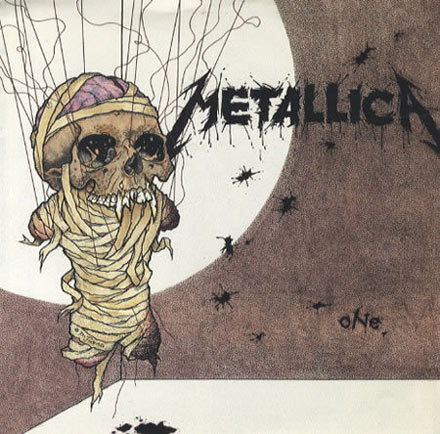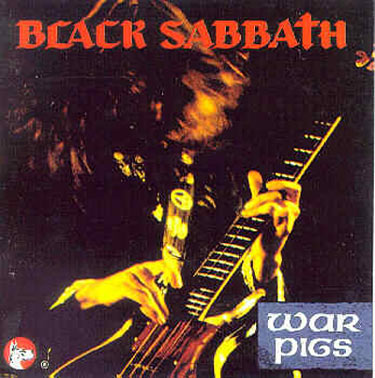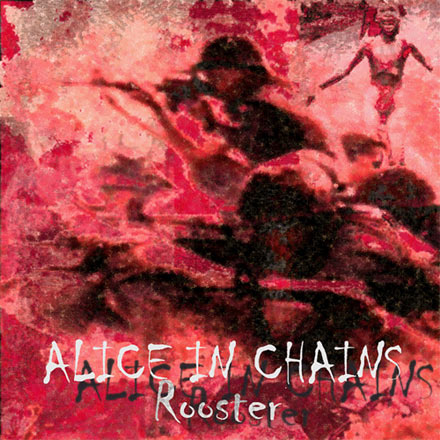Earlier today Radiohead unveiled their poignant tribute song to Harry Patch - the last surviving British army World War 1 veteran – who recently died aged 111. In honour of this, Gigwise takes a look at more songs from over the decades that have dealt with the atrocities of war.

Paul Hardcastle: '19' – Featuring a vocal sample of US television presenter Peter Thomas speaking about post-traumatic stress disorder, the famous anti-war track slams America's involvement in the Vietnam War. The title comes from the statistic that 38% of US soldiers killed in the war were aged just 19 or 20. Recorded in 1985, a decade after the end of the Vietnam War, the song astonishingly hit the top spot in 13 countries.

Metallica: 'One' – The rock titans' epic track was based on the 1939 anti-war novel 'Johnny Got His Gun' by Dalton Trumbo. The book deals with the plight of a World War I soldier, Joe Bonham, who was badly injured in artillery fire losing his arms, legs, eyes, mouth, nose and ears and his ability to see, speak, smell, or hear – the only thing that functions is his mind, rendering him a prisoner in his own body. Metallica's single artwork featured a decapitated body, while the video featured excerpts from the 1971 film adaptation of the novel.

Manic Street Preachers: 'If You Tolerate This Your Children Will Be Next' – The Welsh band's first UK number one dealt with perhaps surprising subject matter; the Spanish Civil War. Its name come from a Spanish Republican poster from the late 1930s which depicted a child killed by Nationalist bombs under the title “If you tolerate this your children will be nextâ€. As well as The Clash's single 'Spanish Bombs', the track takes inspiration from George Orwell's first-hand account of the horrors of the war 'Homage To Catalonia'.

Guns 'n' Roses: 'Civil War' - Born from an instrumental Slash and Duff McKagan used to play in a sound check this Guns 'n' Roses song took on a life of its own when Axl Rose wrote lyrics around it. Essentially an homage to Vietnam style protest songs 'Civil War' mentions both Kennedy and Martin Luther King whilst playing with the dual meaning of the word civil in Civil War.

Black Sabbath: 'War Pigs' - Taken from the classic 1979 album 'Paranoid', this is Black Sabbath's blitzkrieg of an anti-war song. The song title is derived from the term 'walpurgis' meaning a witches sabbath, whilst the outro to the song has the separate title 'Luke's Wall'. The lyrics see Ozzy Osbourne call out politicians for “Only starting the war†and leaving the poor to go out and fight it.

R.E.M.: 'Orange Crush' – Despite the fact that the song shares its name with a soft drink, 'Orange Crush' is actually a reference to the chemical Agent Orange which was used in the Vietnam War. The horrific defoliant was used by the US army and is thought to have resulted in 400,000 Vietnamese deaths or disabilities, plus hundreds of thousands of birth defects. The track also references the story of a young American soldier leaving the comforts of home to fight.

Alice In Chains: 'Rooster' – The 1993 song was written by guitarist Jerry Cantrell and referenced his father's nickname, Rooster, when he served in the Vietnam War. Depicting his dad's macabre experiences on the front line, Cantrell later said that the track “was the start of the healing process between my Dad and I from all that damage that Vietnam caused.†The single cover poignantly featured the image of the Vietnam War – the young girl Phan Thị Kim Phúc running from a napalm attack.

U2: 'Sunday Bloody Sunday' – Opening with a military drumbeat, U2's highly political 1983 anthem soon turns into a heady protest at The Troubles in Northern Ireland - most notably the Bloody Sunday massacre in Derry in January 1972 when British soldiers opened fire on protesters, killing 14 and injuring 29 more. Composed by The Edge, arguably the most hard-hitting moment of the song comes when Bono proclaims “I won't heed the battle callâ€. An earlier version of the track interestingly featured the line “Don't talk to me about the rights of the IRA, UDAâ€, but this was later removed as the band did not want to directly reference political groups.

Pink Floyd: 'When The Tigers Broke Free' - Written about the death of singer Roger Waters' Father in World War Two's Operation Shingle the 1982 song is taken from the movie version of The Wall. As Waters tells it, the forward commander had asked to withdraw his forces from a German Tiger I tank assault, but the generals refused, and "the Anzio bridgehead was held for the price / Of a few hundred ordinary lives" as the Tigers eventually broke through the British defence, killing all of C Company, including Eric Waters.

Pink Floyd: 'Goodbye Blue Sky' - A second entry for Pink Floyd, this time seeing them chastise the negative effect war has on children. In a brief prologue, birds are heard chirping peacefully. The sound of approaching bombers catches the attention of a child, who states quite innocently "Look mummy, there's an aeroplane up in the sky". The implications of this scene are disturbing if obvious. Children are innocent in war, yet always bear the brunt of it. The lyrics go on to describe the memory of the Blitz.“Did you hear the frightened ones? The falling bombs? The flames are all long gone but the pain lingers on.â€

Bob Marley: 'War' - Derived from a speech by Haile Selassie I of Ethiopia this Bob Marley track is a key anti war song. Marley often referred to Selassie as 'The Lion' and, like many, worshipped him as a God. During the 1963 U.N Conference Selassie called for equality amongst all races, class and nationalities which Bob Marley then set to music and 'War' was born.

John Lennon: 'Give Piece A Chance' - The phrase “Give peace a chance†was originally said by Lennon to a journalist in an interview during his famousBed-In with Yoko Ono. He liked the line so much he eventually went on to write the song. The classic anti-war anthem then gained fame when it was sung by half a million demonstrators in Washington at the 1969 Vietnam Moratorium Day.

Paul McCartney: 'Pipes Of Peace' – Lifted from his 1983 album of the same name, this number one hit was Sir Paul's plea for world harmony. The promo video depicted the 1914 Christmas Day truce through the separate stories of a British and German soldier (both played by Sir Paul) when they met up in no man's land to exchange photos and play a game of football. A bomb forces them back to their respective trenches where they both realise they still have each other's pictures.

Edwin Starr: 'War' – One of the most popular protest songs ever committed to plastic, the 1970 Motown smash hit is buoyed by the chorus “"War, what is it good for? Absolutely nothin'!â€. The track was aptly adopted by the anti-Vietnam War movement in the early 1970s.



